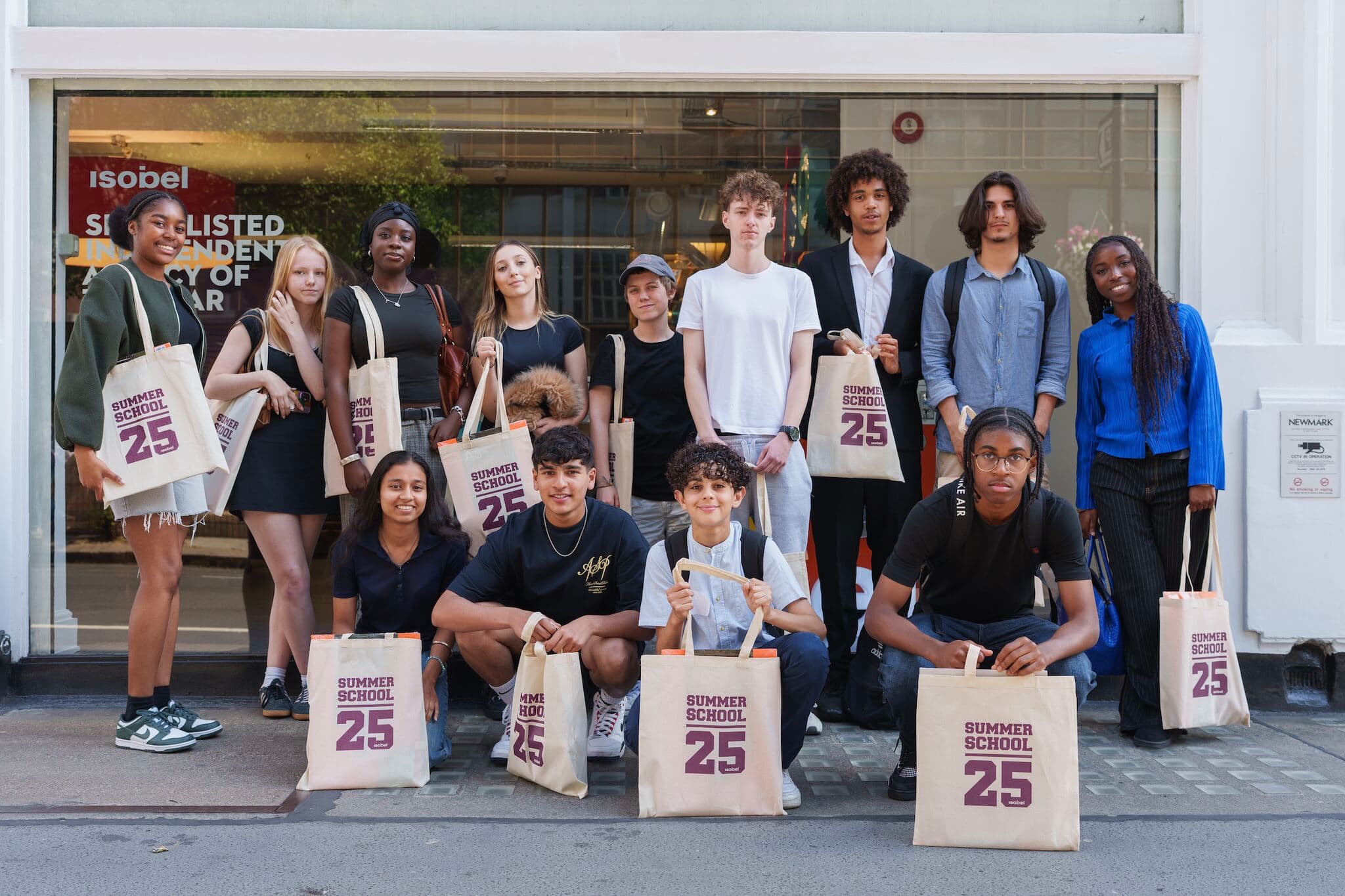
ADVERTISING CAREERS
15 May 2022
See us in The Drum
Jamie’s been in the Drum talking about how we can make advertising an attractive career option for graduates.
Read the full piece below.
Each week, we ask agency experts from across the world and the ad business for their take on a tough question facing the industry, from topical concerns to perennial pain points.
Advertising agencies have an issue with class. As we reported back in March, the industry is over-reliant on recruiting middle-class talent from a select group of universities . One potential solution to ameliorate that problem is to recruit outside of the typical graduate pool. So, how can companies ensure that a career in the industry is as appealing as it can be?
How do you solve a problem like… making advertising an attractive career option to school-age students?
Ryan Paulson, group creative director, BBH USA
’Advertising’ has a branding problem. Consider if instead of ’Would you consider a career in advertising?,’ the question was ’Would you consider a career in branded experiences and entertainment?’ We need to do a better job of explaining what advertising can be. Or should be.
I don’t think younger people hate advertising; they hate bad advertising.
At BBH USA we’re creating activations including a metaverse experience and a reality show. Call it branded entertainment. Call it an experience. Just don’t call it advertising.
Because the people who don’t like ’advertising’ are exactly the kind of people we need to attract.
Lori Bring, vice-president, talent acquisition, Rapp
’Fiercely individual’ is a phrase we use a lot at Rapp, a motto that really resonates with young talent. Not only do we drive personalized advertising, but we hire young talent from all walks of life who add to our culture v simply fitting in to a certain mold. We can’t market to the world if we don’t represent the world. In addition to partnering with several HBCUs to get young, diverse students excited about advertising and the work we do here, we have also moved away from mandating a college degree.
Further, we initiated a new program called ’Emerging Leaders,’ where we train and mentor high school graduates who don’t have the luxury of attending college. They learn about the advertising industry and the work we do over the course of one year. Then, if they chose, they become a full-fledged RAPP employee. We can always do more, but are excited by making some real progress in attracting and retaining diverse talent.
Phil Case, president, chief client officer, Max Connect Digital
I am one of those ‘outside candidates.’ I didn’t study marketing or advertising in college, but instead fell in love with it through an internship. Reaching the next generation is easier than one might think – we just have to show them what the industry offers.
At Max Connect, we partner with colleges and high schools to incorporate advertising into a career-specific curriculum, and host career days for all. We provide internships to high school students along with the college kids so they can envision a future career. Above all, it’s important to mentor young students and become a willing resource in the local community.
Holly Maguire, UK chief executive officer, Superunion
Put simply, the next generation of talent wants more agency in an agency. Research we’ve conducted at Superunion with this age group shows they have the same life goals and affluential aspirations as every generation before them. However, they’re not willing to accept the same well-trodden paths to success and, in the inimitable words of Sinatra, prefer to do things ‘my way.’
Acknowledging this need for empowerment, entrepreneurialism and rapid reward is key to attracting new talent – embracing and encouraging their side hustles and unleashing this ‘hustle’ and individuality in their work with clients. This is something we do with all talent, regardless of tenure.
Jazmen Edwards, talent specialist, RPA
Making advertising an attractive career option is all about showing off how amazing our culture is. Advertising is a creative and collaborative field, and being able to express yourself, your thoughts and your feelings is not common across all fields of work. Accessibility to ERG groups is also very attractive to school-age students – having established groups where an employee from a minority group can feel safe to talk is key for new hires and retention. If the culture of the agency is shown, students will gravitate toward advertising. What is more attractive than a safe space to be creative?
Jamie Williams, managing partner at Isobel
I don’t think it’s true that young school pupils are uninterested in a career in adverting. I just think that most never have the chance to think about it. At Isobel, we try to tackle this head on with our Isobel Summer School. Building every year, we partner with local London schools and offer GCSE-year pupils the opportunity to work in a creative agency for a week. They work in every department, they are set briefs, they produce work and we invite industry-recognized chief executive officers and political leaders to judge their presentations. The pupils tend to start off unsure and sometimes nervous, and more often than not leave passionate and enthusiastic about a career in the creative industries – because, deep down, it’s lots of fun.
Sarah Baumann, managing director, VaynerMedia London
We need to show that advertising is an industry relevant to them – and the best way is to focus the conversation around the platforms they love in a language they understand. That is where their attention is and where we can inspire them. Doing it well boils down to fully understanding what makes younger audiences tick, and showing them it can give them the freedom to create, analyze and influence what they currently enjoy.
It’s also crucial to open doors to people from all backgrounds now, so we have role models for diverse talent in the future. We removed the requirement for university degrees across all roles and created entry-level positions for creators, post-creative strategists and media analysts. It’s enabled us to reach a more diverse talent pool in every respect (eg ethnicity, LBGTQ+, disability, neurodiversity, socio-economic background) and has already been essential in driving our clients’ business in a more relevant and inclusive way.
Yasmin Arrigo, global brand and editorial director, amplify and creator of ADventure
The future talent pipeline urgently needs rewiring, starting with creating equity for young people to access a pathway. Recruiting beyond legacy routes requires raising awareness in the classroom. It’s why I created the outreach program, ADventure, backed by Brixton Finishing School and Common People, to go into state schools and highlight advertising career choices, salaries and growth potential, while flagging campaigns beyond traditional media – in online gaming, IRL and on social platforms that 14-18-year-olds love.
To date, 300 volunteers – from brands, media and agencies including Amplify – have signed up to deliver talks at schools nationwide, reaching over 15,000 pupils face-to-face and thousands more online. Amplify encourages all its teams to spend time in local schools, supporting schemes like ADventure, to ensure the talent pipeline into the industry is truly representative of its audiences.
Matt Garcia, managing director and head of account leadership, Fallon
The Brand Lab at Fallon likes to say: “It’s hard to pursue a career in advertising, if you don’t know it exists.”
The average counselor-to-student ratio at public high schools in the US is 491:1 – and it is often much worse in school systems in less affluent communities. Perhaps it’s less about exposing students to advertising specifically, and more about exposing the world of business, marketing and advertising to students who may otherwise have had no exposure at all. The answer lies in how we get a broader pool of people access to a potential career in advertising.
Olivia Woodhead, head of talent, MullenLowe Group UK
We know gen Z (and in turn gen Alpha) want a career that enables and empowers them to help others, so talking about more than just creative output is vital. They’re looking for purpose; how we can influence societal culture, create positive change, and progress the world through advertising. Here at MLG our mission statement includes: “We will inspire positive behavioral change amongst our audience via communication that sparks emotional connection.” Communicate openly about partnering with organizations they can relate to, such as Creative Mentor Network, which offers career mentoring to young people from lower socio-economic backgrounds, and inspire them via apprenticeships like our ‘The Ship’ program.
Kate Thrumble, executive director, talent, R/GA London
The advertising industry needs to work in partnership with the education system to help open up the hearts and minds of students through experiences; initiatives such as national challenges that are sponsored by an advertising body mean school students can get involved regardless of their perceived strengths and weaknesses. Crucially, agencies should be working together to help with this shift – operating in silos will only see minimal change. At R/GA London, we partner with Brixton Finishing School, enabling us to continue to disrupt how we find new and diverse talent – delivering mentoring sessions and hosting several events for the school over the course of the year.


